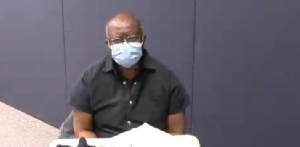Nii Yaote Amugi
In the Graphic editorial of Monday, February 23, 2009 the hint by the Electoral Commission (EC) that it had started moves to switch from manual to electronic form of voter registration for the next general elections due in 2012 was applauded. It was seen as a way to end the perpetual claim and counter claim of rigging by the parties who take part in elections in this country. For me and a lot of people who were deeply involved in the just ended elections not just as voters or party members, supporters and sympathisers but ones who had the responsibility of ensuring a free and fair elections at the polling stations in our various constituencies, this is the best news so far this year. I am not sure what informed this quick decision to move away from manual to electronic voter registration but for those who watched this country come so close to a meltdown, during the last general election, this is a very welcome development.
The proposed electronic voting (e-voting) system is not a new invention and has been practised in countries with very different political and ideological backgrounds. International election observation organizations such as The Carter Center, Organization of American States (OAS) and the European Union (EU) have also monitored elections in some third world countries where e-voting was applied so they know the value of such a system. What saddens my heart is that they have not sought to encourage us at least to switch to the system; so far it has not happened for me to think otherwise.
E-voting systems, however, pose important and unique challenges for election observers: How can observers (local and foreign) assess the workings of electronic systems where the processes of vote counting and tabulation are often invisible? What aspects of traditional observation remain relevant for e-voting observation? What can and should be observed in the automated or e-voting systems? What are the critical and essential access points in e-voting processes that observers need in order to assess the integrity of the voting exercise? Does e-voting present new dynamics or challenges for the interrelationships between relevant stakeholders such as vendors, legislators, election officials, political party officials and others? Are there unique legal or legislative implications for e-voting systems?
The good news is that, to address some of these questions, The Carter Center in the US has developed a methodology for observing elections in which electronic voting technologies are used.
One of the major concerns raised after the first round of the December 2008 general election was that most of the people who were recruited as electoral staff – Returning, Presiding Officers and their Assistants, etc – were compromised one way or the other. It was alleged that one party manoeuvred to get as many of its sympathisers as possible to be recruited as elections officials. To start with as in Mexico, electoral officers are chosen at random from the electoral register, therefore, it is impossible for any one party to try and pack the system with its sympathisers. Not only that, once you are selected you are obliged to serve just like being selected for jury work in the UK or USA. This for me is a very fair arrangement that can be adopted, but will this ever happen here?
How the Machines Work
For example the SmartMatic brand voting machine mentioned in The Carter Center document uses a simple touch screen technology system. The voter selects his preferred candidate by touching the box with his candidate's name and the associated party logo. Once the selection is made, a screen will appear, again displaying the candidate's name and requesting the voter to confirm his selection. Once confirmed, the machine prints a paper receipt, which the voter may check for accuracy before depositing it in a locked ballot box. Meanwhile, the electronic data is encrypted and sent to the National Counting Center for a nearly instantaneous vote tally. To ensure that the number of paper receipts match the electronic votes tallied requires that a sample paper audit be conducted before the official vote count is announced.
Protections Against Fraud
For all its strengths and advantages, in electronic voting one is basically dealing with a “Black Box” and unless stringent measures are put in place, they could lead to even more serious charges of fraud and vote rigging. The source code required to access the machines for example could be split into equal parts, which can then be divided among stakeholders, including a representative from the EC, the parties in government as well as the opposition, pro-government coalitions and observers (local and international). In order for any change to the coding of the computers to be implemented, each of these interested parties must be present and access the machines simultaneously. For legitimate purposes, such as testing the machines and auditing the vote, each party should be allowed to have access to the computers, but any unauthorized tampering be rendered impossible.
Thumbprint (Biometric) Machines
As part of the program to ensure the integrity of e-voting, a separate biometric technology should be deployed to ensure that voters do not cast multiple ballots at different polling stations. Computers at the entrance of polling stations should record the thumbprints of each voter as they enter. The thumbprints should be stored in a centralized database, and observers be automatically notified if a voter has previously cast a ballot at another polling station. The thumbprint machines should be separate from the electronic voting stations, so that the database records only those who have participated in the election, not who or what they voted for.
Such a system in Ghana would definitely go a long way to put to rest the perpetual confusion and accusations of multiple voting that accompany elections in this country.
I spoke earlier about the last election having brought us to the brink of total chaos and that the uninformed could have attested to the tension and palpable fear that gripped us all. In the end I think it was good counsel that prevailed and this was not from the usual quarters. The truth of the matter is that it was the quiet diplomacy that took place between two men (names withheld) and the decision by all others who were privy, to hold their peace and abide by whatever conclusion the two men came up with that saved the day, and that was not easy. Having followed the electronic voting processes as practised in Jamaica, Mexico, etc, I now appreciate the depth of the crisis this country almost run into that day in December 2008.
The EC of Ghana during the December 7, 2008 general election distributed laptop computers to each of its 230 Constituency Collation Officers in the country containing a special software. The source of this software, apart from the EC, was unknown and had not been audited by the other stakeholders – parties in government and the opposition, observers (local and foreign), pro-government and anti-government coalitions - to be used for the collation of the election results at the constituency level. In addition each EC collation officer had a printer that was used to print the results for the party agents to sign after collation. The collation officer also had a GPRS modem which allowed him to send his results by e-mail through the internet to the EC Head Office in Accra. The 230 laptop computers were given to the EC Collation Officers about 3 days before the election and were kept at their homes/stations. Due to the lack of very high security features on these EC computers, anyone with access to the computer could tamper with the software. In other jurisdictions the source codes are distributed among the various interested parties - stakeholders. The EC Collation Officers did the collation all by themselves without any party agent from any of the parties and/or observers being close enough to see or verify the numbers being typed/keyed into the computer. What aroused the fears of some of the collation officers was the fact that sometimes the numbers they typed into the computers changed once they saved the data. They suspected that the EC software may have been designed to give NPP lower votes and NDC higher votes during the collation exercise.
When some EC collation officers in some constituencies in Kumasi also noticed this anomaly, they abandoned the use of the EC computers and collated the results manually. It appeared then to these officers that the EC collation software which may have been designed to give lower results for NPP and higher results for the NDC was also being used by the NPP Collation Team in the Operations Room at the EC Head Office in Accra. So the results of the two parties may have been corroborated inadvertently but only to justify the fraud. Following this complaint the EC software was reviewed and it showed that the results compiled using the EC’s laptop computers may have been compromised seriously. This was so because of the following:
1. The EC Computers did not have appropriate security to prevent the EC Collation Officers from tampering with and modifying the operation of the computer itself.
2. The EC collation software allows the Collation Officer to change the number of registered voters at any polling station to any number he desires. This could allow the EC collation officer to inflate the number of registered voters at a polling station to allow him to increase the votes obtained by the any of the contesting parties.
3. The EC collation software did not have adequate security features thus making it possible for a Collation Officer to go behind the main software and make changes to the votes cast at a polling station that he has captured using the software.
4. Due to inadequate security features in the EC software, an EC Collation Officer with additional IT skills can modify the EC software such that the votes obtained by NPP for example will always be reduced by a number he desires and the NDC votes increased by a number he desires.
Following this discovery, meetings were held with EC staff to decide the next line of action. Clearly anybody ready to cause confusion and mayhem could have made these findings public, the results disputed, and what would have followed from then on would have been anybody’s guess. The fact that all these happened behind closed doors and even the affected party agreed to an out of the public solution is something all of us have to be grateful for. Because without that we would not be enjoying the peace that we take for granted today.
There is no such thing, anywhere in the world, as a perfect election arrangement (ie. free and fair), not even in the UK or US. Events in the US, in Florida to be specific, during the 2000 presidential elections, immediately, come to mind. Election monitors, normally, do not look out for perfections but rather general trends, while ignoring isolated irregularities.
Was the election FREE? …means, that on the day of the election (polling), were people, for example, intimidated, prevented from casting their ballot, etc, etc? Was the election FAIR? …on the other hand means, was the electoral playing field level? Ensuring a level electoral playing field starts several months or even years before the voting day. It includes among other things:-
• accurate census figures
• credible electoral register
• access to state owned media
• transparently fair Electoral Commission and Commissioner, and electoral laws, rules and regulations which are not calculated to benefit one party or others
• ensure non-exploitation of incumbency.
Next year 2010 is census year, after which the number of Districts and Constituencies will be reviewed and to be followed by the production of a completely new voters register before election 2012, which will give the EC the opportunity to switch from manual to electronic voter registration as a first step toward eventually achieving electronic voting in the very near future.
Nii Yaote Amugi
P.O. Box CT 1362
Cantonments- Accra niiyaoteamugi@yahoo.com
Opinions of Thursday, 7 May 2009
Columnist: Amugi, Nii Yaote














